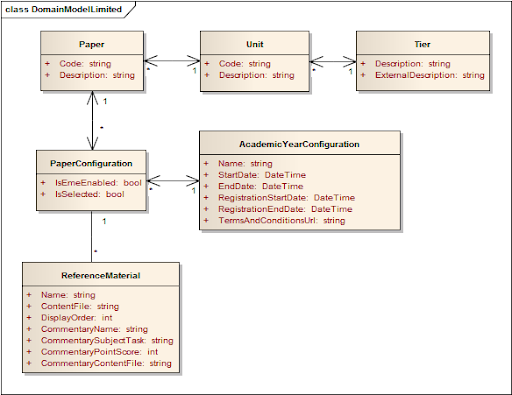I have the following domain set up for persistence with NHibernate:

I am using the PaperConfiguration as the root aggregate.
I want to select all PaperConfiguration objects for a given Tier and AcademicYearConfiguration. This works really well as per the following example:
ICriteria criteria =
session.CreateCriteria<PaperConfiguration>()
.Add(Restrictions.Eq("AcademicYearConfiguration", configuration))
.CreateCriteria("Paper")
.CreateCriteria("Unit")
.CreateCriteria("Tier")
.Add(Restrictions.Eq("Id", tier.Id))
return criteria.List<PaperConfiguration>();
(Perhaps there is a better way of doing this though).
Yet also need to know how many ReferenceMaterials there are for each PaperConfiguration and I would like to get it in the same call. Avoid HQL - I already have an HQL solution for it.
I know this is what projections are for and this question suggests an idea but I can't get it to work.
I have a PaperConfigurationView that has, instead of IList<ReferenceMaterial> ReferenceMaterials the ReferenceMaterialCount and was thinking along the lines of
ICriteria criteria =
session.CreateCriteria<PaperConfiguration>()
.Add(Restrictions.Eq("AcademicYearConfiguration", configuration))
.CreateCriteria("Paper")
.CreateCriteria("Unit")
.CreateCriteria("Tier")
.Add(Restrictions.Eq("Id", tier.Id))
.SetProjection(
Projections.ProjectionList()
.Add(Projections.Property("IsSelected"), "IsSelected")
.Add(Projections.Property("Paper"), "Paper")
// and so on for all relevant properties
.Add(Projections.Count("ReferenceMaterials"), "ReferenceMaterialCount")
.SetResultTransformer(Transformers.AliasToBean<PaperConfigurationView>());
return criteria.List< PaperConfigurationView >();
unfortunately this does not work. What am I doing wrong?
The following simplified query:
ICriteria criteria =
session.CreateCriteria<PaperConfiguration>()
.CreateCriteria("ReferenceMaterials")
.SetProjection(
Projections.ProjectionList()
.Add(Projections.Property("Id"), "Id")
.Add(Projections.Count("ReferenceMaterials"), "ReferenceMaterialCount")
).SetResultTransformer(Transformers.AliasToBean<PaperConfigurationView>());
return criteria.List< PaperConfigurationView >();
creates this rather unexpected SQL:
SELECT
this_.Id as y0_,
count(this_.Id) as y1_
FROM Domain.PaperConfiguration this_
inner join Domain.ReferenceMaterial referencem1_
on this_.Id=referencem1_.PaperConfigurationId
The above query fails with ADO.NET error as it obviously is not a correct SQL since it is missing a group by or the count being count(referencem1_.Id) rather than (this_.Id).
NHibernate mappings:
<class name="PaperConfiguration" table="PaperConfiguration">
<id name="Id" type="Int32">
<column name="Id" sql-type="int" not-null="true" unique="true" index="PK_PaperConfiguration"/>
<generator class="native" />
</id>
<!-- IPersistent -->
<version name="VersionLock" />
<!-- IAuditable -->
<property name="WhenCreated" type="DateTime" />
<property name="CreatedBy" type="String" length="50" />
<property name="WhenChanged" type="DateTime" />
<property name="ChangedBy" type="String" length="50" />
<property name="IsEmeEnabled" type="boolean" not-null="true" />
<property name="IsSelected" type="boolean" not-null="true" />
<many-to-one name="Paper" column="PaperId" class="Paper" not-null="true" access="field.camelcase"/>
<many-to-one name="AcademicYearConfiguration" column="AcademicYearConfigurationId" class="AcademicYearConfiguration" not-null="true" access="field.camelcase"/>
<bag name="ReferenceMaterials" generic="true" cascade="delete" lazy="true" inverse="true">
<key column="PaperConfigurationId" not-null="true" />
<one-to-many class="ReferenceMaterial" />
</bag>
</class>
<class name="ReferenceMaterial" table="ReferenceMaterial">
<id name="Id" type="Int32">
<column name="Id" sql-type="int" not-null="true" unique="true" index="PK_ReferenceMaterial"/>
<generator class="native" />
</id>
<!-- IPersistent -->
<version name="VersionLock" />
<!-- IAuditable -->
<property name="WhenCreated" type="DateTime" />
<property name="CreatedBy" type="String" length="50" />
<property name="WhenChanged" type="DateTime" />
<property name="ChangedBy" type="String" length="50" />
<property name="Name" type="String" not-null="true" />
<property name="ContentFile" type="String" not-null="false" />
<property name="Position" type="int" not-null="false" />
<property name="CommentaryName" type="String" not-null="false" />
<property name="CommentarySubjectTask" type="String" not-null="false" />
<property name="CommentaryPointScore" type="String" not-null="false" />
<property name="CommentaryContentFile" type="String" not-null="false" />
<many-to-one name="PaperConfiguration" column="PaperConfigurationId" class="PaperConfiguration" not-null="true"/>
</class>
You should use Projections.GroupProperty() instead of Projections.Property().
If you love us? You can donate to us via Paypal or buy me a coffee so we can maintain and grow! Thank you!
Donate Us With